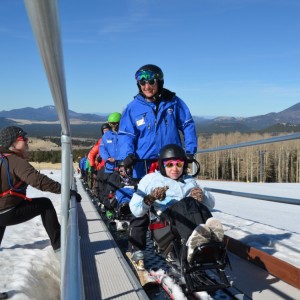 Alex Davenport has big plans for expanding the adaptive ski and snowboard program at Arizona Snowbowl. Thanks to a recent $17,000 grant from Flagstaff Medical Center (FMC), he is well on his way to meeting his goal and seeing that Special Olympians, wounded soldiers and other disabled individuals can enjoy the thrill of winter sports.
Alex Davenport has big plans for expanding the adaptive ski and snowboard program at Arizona Snowbowl. Thanks to a recent $17,000 grant from Flagstaff Medical Center (FMC), he is well on his way to meeting his goal and seeing that Special Olympians, wounded soldiers and other disabled individuals can enjoy the thrill of winter sports.
Davenport coordinates the specialized adaptive programs for Snowbowl’s Ski & Ride School. Its mission, as Snowbowl’s Director of Sales and Marketing Jason Stratton says, is to “try to get anybody and everybody into winter sports.”
Davenport leads a group of instructors that provided about 170 adaptive lessons last year. This year, they plan to increase that number to 300. Such growth requires financial support. FMC representatives say the hospital was happy to help out.
Rick Smith, vice president of development and marketing for FMC’s parent company, Northern Arizona Healthcare, said, “FMC is a community partner and we sponsor activities through either sponsorships or grants to support efforts that are directly related to our mission at the hospital. Our board thought that the adaptive ski and snowboard program was just such a project.”
“Adaptive skiing,” Davenport explained, “involves having an instructor who adapts to the needs of students, whether that means through special equipment or different teaching methods.” It dates back to World War II Europe, when injured servicemen wanted to return to a normal life that included skiing. Since then, programs have been created worldwide that cater to anyone with physical or mental disabilities.
Davenport said, “We had limited equipment in the past and weren’t able to accommodate all the requested lessons. With this gracious donation, we were able to buy two more bi-skis and four ski bikes this year alone.”
Bi-skis are a type of sit-ski, an apparatus that involves a person sitting on a seat that has one (mono-ski) or two (bi-skis) underneath it. Bi-skis are particularly useful for people with muscular dystrophy, spinal cord injuries or other problems that prevent them from skiing on their own. An instructor on his/her own skis pilots the equipment from behind.
FMC’s grant is also supporting other aspects of the adaptive program. “It goes to certification and training, events and other special needs,” said Smith. “The funding for this comes from earnings on our investments. It doesn’t come from direct contributions, although at some point, it could come from these sources.”
On Feb. 13, three dozen local students experienced the upgraded program firsthand. They braved mildly windy conditions at Snowbowl to participate in lessons and training for the 2015 Special Olympics Arizona Mountain Area Alpine Skiing Competition.
“The student athletes are from Coconino High School, Sinagua Middle School and Flagstaff High School,” said Special Olympics Arizona Mountain Area Director Jim Rudown. “This is our third year doing the training, but the first year with the sit-skis.”
Some of the students learned how to use snowboards while others enjoyed whooshing through the snow at the Hart Prairie Beginner Area. Sunni Shores, a freshman at Coconino High School, rode one of the bi-skis piloted by Davenport. “I had a lot of fun and was lucky to ride with the main teacher,” she said.
The successful session at Snowbowl reinforced Davenport’s long-range ambitions for the adaptive program. “I currently have an eight-year plan that involves a non-profit for not only skiing and snowboarding but for all adaptive sports like hiking and kayaking and rafting and water skiing.”
With the recent support from FMC, Davenport is optimistic and believes this goal is one step closer to reality. FBN
By Kevin Schindler
Flagstaff Business News







